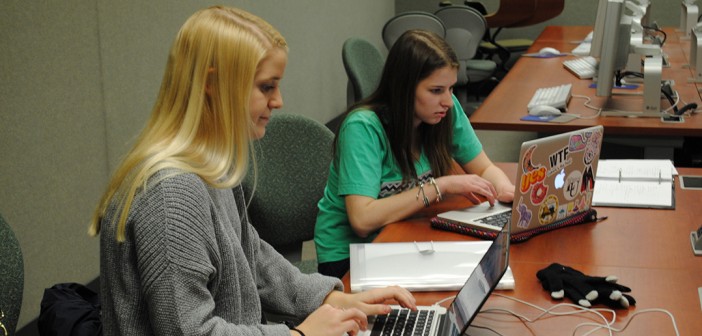Out of Lehigh’s 4,900 undergraduates, there are roughly 2,100 women. As of spring 2015, the P.C. Rossin College of Engineering and Applied Sciences had a total of 1,784 students, 545 of which are women, according to the Office of Institutional Research.
Nationwide, the average for women with engineering majors is anywhere from 18 to 20 percent, while at Lehigh the women engineer population is 28 percent, much higher than the national average, according to the website.
The college of engineering is the largest academic college at Lehigh and is comprised of 36 percent of the undergraduate student body, according to the Lehigh website.
Typically people expect men to have majors in the science, technology, engineering and math fields. Women engineers often feel secluded because of a common stereotype that most women have majors in the College of Arts and Sciences.
Alyssa Altman, ’17, a bio-engineering major, said she finds that other people are surprised, but impressed, when they find out her major. She said that the bio-engineering program has a lot of females in the major and there are more women in her classes than men.
Lehigh has worked to improve stereotypes regarding women engineers around campus and has developed opportunities to help young women succeed in the field.
Lehigh’s Society of Women Engineers is an organization that connects first-year women engineering majors with each other, as well as to upperclassmen mentors. The group works year-round to help women engineers with the transition from high school to college. They also work to instill a sense of community for these women.
UGI Utilities Inc, a natural gas and electric utility company, provides grant money that is used to help fund many programs offered for women engineers at Lehigh, such as the Society of Women Engineers.
The society hosted a lecture given by Dr. Christine Grant, called “Empowering Women Engineers,” at Lehigh on Feb. 10.
Grant is a professor of chemical and bio-molecular engineering and the associate dean of faculty development and special initiatives at North Carolina State University. She has been giving these seminars and workshops to women in STEM fields for many years.
During her lecture, Grant said it is important to “prove excellence in a dimly lit room.” She then explained that when people did not believe in her ability to do something, which is what she called the “dimly lit room,” she worked hard to prove them wrong.
Catie Barbagallo, ’17, a civil engineering major, said “people are usually shocked when they find out I am an engineer, but instead of getting offended, I am motivated.”
“Engineering requires a lot of sacrifice to be successful,” Grant said during the lecture. She also mentioned that there is a lot of pressure for women engineers in particular because they are inspired to succeed, but expected to fail.
A key to success for a woman engineer is to find support from mentors, peers and family members who they can go to feel comfortable. Grant said that by doing this, women engineers become more empowered and encouraged to succeed.
Natalie Bird, ’17, a civil engineering major, said she definitely feels included, especially in the classroom. Barbagallo agreed. They both said they felt that their professors do not treat them any differently than any of the men in their courses, and that all of their professors expect the same amount of effort and work as any other student in the class.
Barbagallo and Bird also felt that although they like their majors, being an engineer in general almost forces students to like their major, because all the work and time put into each class helps them to appreciate the subjects they are studying.






Comment policy
Comments posted to The Brown and White website are reviewed by a moderator before being approved. Incendiary speech or harassing language, including comments targeted at individuals, may be deemed unacceptable and not published. Spam and other soliciting will also be declined.
The Brown and White also reserves the right to not publish entirely anonymous comments.